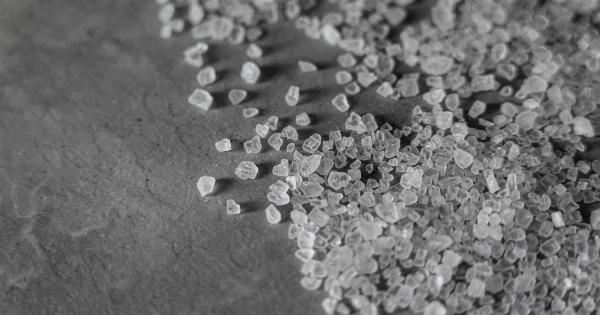Teenage obesity has become a major health concern in recent years. The rising prevalence of this condition has been attributed to various factors, such as poor diet and lack of physical activity.
However, one factor that is often overlooked in discussions about teenage obesity is high salt intake. While salt is an essential mineral required for the proper functioning of the body, excessive consumption of salt can have detrimental effects on health, including contributing to the development of obesity.
The Role of Salt in the Body
Salt, also known as sodium chloride, plays a crucial role in maintaining various bodily functions. It helps regulate fluid balance, maintain blood pressure, and support nerve and muscle function.
Sodium, the primary component of salt, is necessary for the transmission of nerve impulses and the contraction of muscles.
However, the intake of salt has dramatically increased in recent decades due to the widespread popularity of processed foods.
Processed and packaged foods, including snacks, fast food, and canned soups, often contain high levels of sodium for flavor enhancement and preservation purposes. This excessive salt consumption is a significant concern, especially among teenagers, who are more likely to consume such foods regularly.
How Does Excessive Salt Intake Contribute to Teenage Obesity?
High salt intake can contribute to teenage obesity through several mechanisms:.
1. Increased Appetite
Ingesting high amounts of salt can lead to increased thirst and a greater desire to consume more food. Salt stimulates the production of hormones such as aldosterone, which can affect appetite regulation and increase hunger.
This can result in excessive calorie intake and subsequent weight gain.
2. Water Retention
Consuming excessive amounts of salt can cause water retention in the body. This extra water weight can contribute to a higher number on the scale and make individuals appear heavier than they actually are.
The bloating effect of water retention can negatively impact body image and self-esteem, leading to unhealthy eating habits and reduced physical activity.
3. Impact on Metabolism
Research suggests that a high-salt diet may disrupt normal metabolic processes, leading to impaired glucose tolerance and insulin resistance.
These metabolic dysfunctions can contribute to weight gain and the development of obesity and its associated health complications.
4. Influence on Food Choices
Foods high in salt often tend to be highly processed and lacking in nutritional value. These foods are typically energy-dense but nutrient-poor, offering little satiety and leaving individuals feeling hungry shortly after consuming them.
This can lead to greater overall calorie intake and increase the risk of weight gain and obesity.
5. Disruption of Gut Microbiota
Emerging evidence suggests a link between high salt intake and alterations in gut microbiota composition. Disruptions in the balance of gut bacteria have been associated with various metabolic disorders, including obesity.
The excessive consumption of salt may negatively impact the diversity and abundance of beneficial gut bacteria, potentially contributing to weight gain and obesity in teenagers.
Effects of Salt on Blood Pressure
In addition to its role in obesity, high salt intake is also strongly associated with an increased risk of high blood pressure. Hypertension is a significant risk factor for cardiovascular disease, stroke, and other health problems.
The relationship between salt intake and blood pressure further highlights the importance of addressing the issue of excessive salt consumption, particularly among teenagers.
Strategies to Reduce Salt Intake and Promote Healthier Lifestyles
It is crucial to adopt strategies that can help reduce salt intake and promote healthier lifestyles among teenagers. Some effective approaches include:.
1. Encouraging Home-Cooked Meals
Home-cooked meals allow better control over the amount of salt used in food preparation. Encourage parents and teenagers to cook meals at home using fresh ingredients and minimal added salt.
This practice can significantly reduce overall sodium intake and promote the consumption of more nutritious meals.
2. Raising Awareness
Health education campaigns targeting teenagers and their families can help raise awareness about the risks associated with excessive salt consumption.
By providing information on the detrimental effects of high salt intake on health, individuals can make informed decisions and choose lower sodium alternatives.
3. Reading Food Labels
Encourage teenagers to read food labels and choose products with lower sodium content. By becoming familiar with the sodium content of different foods, individuals can make healthier choices and limit their exposure to excessive salt intake.
4. Increasing Physical Activity
Regular physical activity plays a vital role in maintaining a healthy weight. Encourage teenagers to engage in activities they enjoy, such as sports or dance, to increase their daily physical activity levels.
Engaging in regular exercise can help offset the negative effects of excessive salt intake on weight and overall health.
5. Promoting Balanced Diets
Emphasize the importance of a well-balanced diet, rich in fruits, vegetables, whole grains, and lean proteins. These nutrient-dense foods not only provide essential vitamins and minerals but are also naturally low in sodium.
By promoting a diet based on these foods, teenagers can reduce their reliance on high-salt processed foods.
Conclusion
Excessive salt intake has emerged as a contributing factor to teenage obesity, alongside other well-known influencers such as poor diet and lack of physical activity.
The impacts of high salt consumption on appetite, water retention, metabolism, food choices, and gut health make it a significant concern for adolescent health. By raising awareness, adopting healthier eating habits, and promoting an active lifestyle, we can mitigate the negative effects of excessive salt consumption and help teenagers maintain a healthy weight and overall well-being.




























